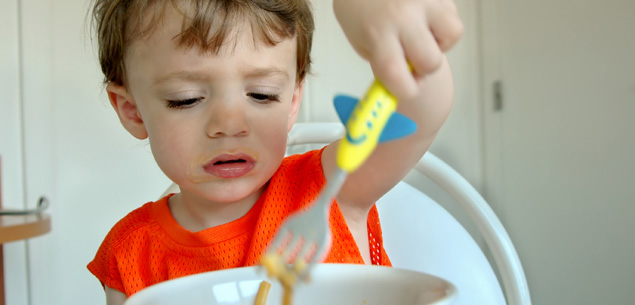Dear Diane,
I’d love some advice about my five-year-old girl, who is a fussy eater. Many nights, she goes to bed hungry because she hasn’t eaten dinner. She’s fine with breakfast, which is porridge. At lunchtime she’ll have bananas on toast or a jam sandwich made with wholemeal bread. Our afternoon teas are healthy: fresh fruit, air-popped popcorn with salt and butter or fruit smoothies. The main problem is dinner. She eats sausages, plain pasta and plain couscous. She’ll have yoghurt, cheese sauce, grated cheese, tomato sauce and the odd raw carrot. But not much more.
I’ve read you need to offer children a new food many times before they’ll eat it but she still won’t eat greens, or potatoes, or stew, or meat (apart from plain chicken or sausages). All her life she’s been offered good, home-cooked food, but rejects it. My sister has a couple of fussy eaters and she feeds them separately, but I don’t see how that will help. When we have pudding, you are only allowed it if you finish your first course. But that doesn’t work either – she’d still rather go hungry if she doesn’t like the look of the food. Should I keep letting her go hungry, or is there something I could try?
Wendy, by email
Dear Wendy,
It is possible that your daughter is not terribly hungry at dinner time. At five, she will be having very busy and often exhausting days and may not feel like eating. You are giving her a wonderfully healthy diet so most of her nutritional needs will have been met before dinner. Most children are ravenous right after school and you may find that she may need a larger afternoon tea. Think about giving her an egg, cheese or meat sandwich so that if she doesn’t eat dinner, you know she has had reasonable quantity of protein and carbohydrate. One problem we face is that our way of eating is just about opposite to our children’s natural appetite. Our bodies need a larger quantity of food after we have fasted all night, a middle-sized quantity to get us through the afternoon and a small meal at night.
Instead, we try to give our children a large helping of food that they find difficult to eat at the time of day when they are not hungry and are tired. Serve her a small helping of food on a little plate. That way, she has a good chance of finishing. Another thing to pay attention to is the fact that she likes sausages but not stew – some children cannot cope with “stringy” meat but enjoy finely minced meat. This can be to do with the development of their teeth. Try her on minced meat and see if that makes a difference. Finally, remember that evening meals are about nutrition and sociability. Focus on pleasant conversation and take your attention off what she is eating. If you drop the tension, she may well have a bigger appetite.
Diane Levy provides expert answers to your parenting queries. Send your questions to: [email protected] Diane’s parenting books are available in book shops.




